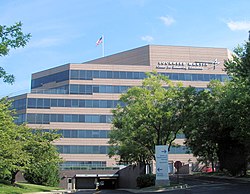 AN/APG-78 Longbow radar on a JGSDF AH-64D Apache | |
| Country of origin | United States |
|---|---|
| Manufacturer | Lockheed Martin / Northrop Grumman |
| Introduced | 1998 |
| Type | Millimeter-wave fire-control radar |
| Frequency | Ka band |
| Range | 5.0 mi (8 km) [1] |

The AN/APG-78 Longbow is a millimeter-wave fire-control radar (FCR) system for the AH-64D/E Apache attack helicopter. It was initially developed in the 1980s as the Airborne Adverse Weather Weapon System (AAWWS) as part of the Multi-Stage Improvement Program (MSIP) to enhance the AH-64A. [2] By 1990, both AAWWS and MSIP were renamed Longbow. [3] The radar is produced by Longbow LLC, a joint venture of Lockheed Martin and Northrop Grumman. [1]
Contents
In accordance with the Joint Electronics Type Designation System (JETDS), the "AN/APG-78" designation represents the 78th design of an Army-Navy airborne electronic device for radar fire-control equipment. The JETDS system also now is used to name all Department of Defense electronic systems.
